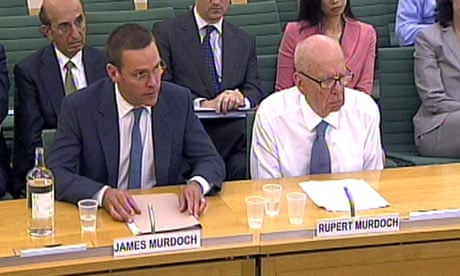Rupert Murdoch's News International company has been found by a parliamentary committee to have "deliberately" tried to block a Scotland Yard criminal investigation into phone hacking at the News of the World.
The report from MPs on the all-party home affairs committee will be released on Wednesday morning. Its publication has been moved forward in time for a statement on the scandal by the prime minister, David Cameron.
The report's central finding comes a day after Rupert and James Murdoch testified before the culture, media and sport committee. The home affairs committee report marks an official damning judgment on News International's actions.
It finds the company "deliberately" tried to "thwart" the 2005-2006 Metropolitan police investigation into phone hacking carried out by the News of the World.
The investigation came at a time when Andy Coulson was editor. Coulson went on to be chosen by Cameron to be his director of communications, before resigning.
The full report's findings include:
Police failed to examine a vast amount of material that could have identified others involved in the phone-hacking conspiracy and victims.
John Yates made a "serious misjudgment" in deciding in July 2009 that the Met's criminal investigation should not be reopened. He resigned on Monday.
The new phone-hacking investigation should receive more money, from government if necessary, so it can contact potential victims more speedily. A fraction have been contacted so far.
The information commissioner should be given new powers to deal with phone hacking and blagging.
The central conclusion about NI's hampering of the police investigation comes after the home affairs committee heard evidence from senior Met officers who were involved in the case that News International obstructed justice.
Last week the man who oversaw the first Metropolitan police investigation into phone hacking, Peter Clarke, damned News International: "If at any time News International had offered some meaningful co-operation instead of prevarication and what we now know to be lies, we would not be here today."
The first police inquiry led to the conviction in January 2007 of one journalist, Clive Goodman, and the private investigator Glenn Mulcaire.
But subsequent developments, and the handing over of documents by News International, are alleged to show the practice of phone hacking was much more widespread than the company ever admitted. NI claimed for years it was the work of one rogue reporter, a defence the company has now abandoned, at least in part because of a Guardian investigation that eventually led to the Met reopening its inquiry.
The committee heard on Tuesday that "blindingly obvious" evidence of corrupt payments to police officers was found by the former director of public prosecutions, Lord Macdonald, when he inspected News of the World emails. Lord Macdonald said that when he inspected the messages from NI it took him between "three to five minutes" to decide that the material had to be passed to police.
The emails and other material has been in the possession of NI or its lawyers for years.
MacDonald said: "The material I saw was so blindingly obvious that trying to argue that it should not be given to the police would have been a hard task. It was evidence of serious criminal offences."
Ed Llewellyn, David Cameron's chief of staff, was dragged into the phone-hacking scandal on Tuesday when two of the country's most senior police officers revealed he had urged them not to brief the prime minister on developments.
Llewellyn sought to stop information about the scandal being passed on to the prime minister in September, a few days after the New York Times ran an article that claimed Coulson had been aware of the use of the illegal practice when he edited the News of the World.
The former Metropolitan police commissioner Sir Paul Stephenson – who resigned on Sunday – and former assistant commissioner John Yates – who followed him on Monday – told the House of Commons home affairs select committee that they believed Llewellyn was keen to avoid "compromising" the prime minister.
Yates told the committee he was offering to discuss only police protocol – not operational matters.
Committee chair Keith Vaz MP said: "There has been a catalogue of failures by the Metropolitan police and deliberate attempts by News International to thwart the various investigations. Police and prosecutors have been arguing over the interpretation of the law.
"The new inquiry requires additional resources and if these are not forthcoming it will take years to inform all the potential victims. The victims of hacking should have come first and I am shocked that this has not happened."
